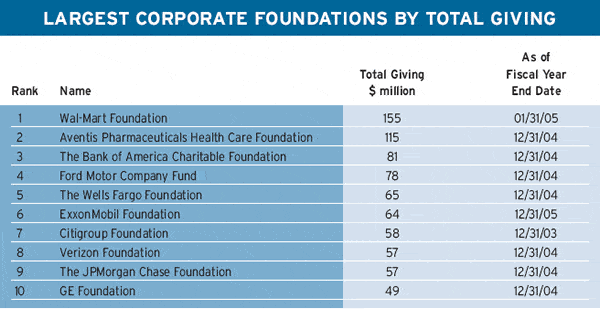SETTING UP CHARITABLE FOUNDATIONS HAS BECOME INCREASINGLY FASHIONABLE AMONG US CORPORATIONS. THE BENEFITS CAN BE SIGNIFICANT FOR ALL CONCERNED.
 |
|
|
Today there are some 68,000 charitable foundations in the US, as measured by the Foundation Center, an independent philanthropy tracker. Though not all are corporate-sponsored, their aggregate generosity soared to nearly $34 billion last year, a 5.7% jump from the year before and a new high. Why the upsurge in benevolence? Its very important these days to have a good reputation as a corporate citizen, particularly for an industrial company that hasnt put a lot of money into branding, insists Jack Bergen, a senior vice president at Siemens and head of its foundation.
Charitable urgesand tax deductions can be satisfied in a number of ways. Many companies sponsor a United Way drive or take up a collection for a local cause. Others establish donor-advised funds, which are separate legal entities run by a community organization or financial firm, usually for a nominal fee. In either case, the donor company can specify preferences for where the funds ultimately go, but the actual distribution of charitable grants is handled by the outside agency.To a degree, the donor company loses control of how its money is used. Big companies want control, says Shannon King Nash, a partner at Guydon Love, a Washington, DC, law practice, and CEO of Nash Management Group, a Los Angeles-based consulting firm. Having your own foundation is also a status symbol. It says youve arrived.
Whatever the value of that status, foundations are subject to myriad regulations. As 501(c)3 nonprofit organizations, they are technically separate legal entities. All of their activities must be philanthropic, and their grants awarded exclusively to other nonprofits. (Siemens scholarships are awarded to schools on behalf of prize-winning students, not directly to the students themselves.) They are subject to an excise tax on dividends, interest and capital gains and must file returns with the IRS, disclosing their grantees, investment income (if any) and other activity.
All expenses, however, are usually covered by the parent company. Many companies set aside a percentage of annual revenue for their foundations, while others match employee donations, or both. A few endow a foundation with a one-time mega-donation that throws off sufficient income to cover charitable grants and day-to-day expenses. Whatever the funding method, the foundation cannot take contributions from other sources. The sponsoring company not only provides 100% of the funding but sets the foundations mission, picks its board of directors and often hires its staff.
By far the most vexing regulatory problem for corporate foundations, according to Washington, DC-based Council on Foundations, concerns self-dealing. The rule of thumb is, The company can give as much as it wants to the foundation, but the foundation cannot give anything of financial value back to the company, explains Judy Belk, who ran the Levi Strauss Foundation for 10 years before joining Rockefeller Philanthropy Advisors, an organization that assists charitable endeavors.
The self-dealing restriction may sound simple enough, but it can become quite complex. It is because of this rule that foundation personnel are typically paid by the parent company. If the foundation employed its own staff, none of the personnel could do anything for the company. When I was responsible for the Levi Strauss Foundation, I was an employee of the company, not the foundation, says Belk. I also managed the companys social-responsibility practices, worked with its environmental-impact unit and did other corporate work. Im sure a few corporate foundations pay their own staff, but its cleaner not to. Having corporate employees staff the foundation, she adds, is a best practice in this field.
Self-dealing can get stickier still. If the foundation is invited to buy a table at a charity dinner, it better pass. Who can it invite to sit at the table? Technically, the foundation is staffed by company employees, and company employees cannot eat a meal paid for by the foundation without violating the selfdealing rule.It doesnt matter what the dinner is worth; its considered a selfdealing benefit, says Nash, who is a veteran of the Amgen Foundation. At Amgen we had to put in a policy to make it clear that if the foundation pays for the table, it can only send people who actually work for the foundation. That was a problem, because the foundation didnt have any employees.
Slip-ups, however accidental, are no doubt common. Still, those familiar with corporate foundations caution that the penalties can be very steep thanks largely to a 1996 addition to the tax code. Under this rule the IRS can not only revoke a foundations taxexempt status if it is found guilty of breaking the self-dealing restriction but pursue the individuals responsible for the violationeven board members who knew it was going on and did nothing to stop it. The IRS requires the guilty to reimburse the foundation and pay a substantial penalty, Nash notes.
Other Corporate Philanthropy
Foundations arent only for large companies.Washington, DC, law firm Venable maintains a foundation that complements our pro bono work, says foundation executive director and former US attorney general Benjamin Civiletti.With an annual budget of some $1.5 million, it is staffed entirely by volunteers. Launched in 1982 with an aim to give back to the communities which have given us so much, the foundation targets disadvantaged children and others in real need in the DC area, says Civiletti. It provides free legal, educational and healthcare-related assistance.
Like the Venable Foundation, many other corporate foundations focus at least partly on needs related to the parent companys line of work. For example, the Howard Perry and Walston Foundation of Coldwell Banker Real Estate, a subsidiary of Cendant, supports a variety of housing-related charities, especially Habitat for Humanity. Among its accomplishments last year was raising $150,000 to sponsor three new homes, which will be built largely by Coldwell Banker volunteers. By matching employee contributions at 50 cents on the dollar, it also collected $100,000 for Hurricane Katrina relief. These and other efforts help create a rare sense of teamwork in a large organization of independent contractors, says Denise Hutchins, executive director.
In healthcare, many companies choose to offer products such as pharmaceuticals or employee expertise to needy populations. Through its Global Health Fellows program, drug maker Pfizer lends its staff to nongovernmental organizations that combat AIDS, malaria, tuberculosis and other virulent diseases in Africa, Asia, Eastern Europe and Latin America. This, in addition to its charitable foundation, is a way to expand our philanthropy beyond just giving out grants and medicine, says Paula Luff, Pfizers director of international philanthropy.

Advantages
Whether from a foundation or this kind of ancillary philanthropic program, there is one big benefit to the sponsoring company that raises no regulatory red flags: the goodwill it generates. Its wonderful PR, declares Nash,and under tax law its considered an incidental benefit. Its ignored, de minimis. As long as the corporate marketing department doesnt interact with the foundation and their budgets dont overlap this windfall for the companys reputation is completely permissible.
Our foundation has been tremendous for our companys public relations, concurs Andrew Hayes of Chicago-based realtor Baird & Warner, adding, Sales agents tell me theyve secured business because of what we do philanthropically.
Naturally, many corporate officers know this from the get-go. Industry insiders point to the Nike Foundation as an exemplary philanthropic effort. The sneaker maker, once criticized for its Third World production facilities, now donates nearly 3% of its annual pretax income to its namesake foundation.The foundation in turn gives grants to programs that help impoverished girls in Africa. More than that, the company supports the foundations goals in other ways. They are proactive, says Belk. They dont only bring dollars to the cause but the full assets of the company, to have the broadest impact. She cites the companys public condemnation of abuses and the use of employee expertise where appropriate. They look at the total picture, she says.
More Than a Tax Deduction
The Council on Foundations reports that customers with a favorable impression of a companys philanthropy are three times more likely to be loyal customers. And according to the Center for Corporate Citizenship at Boston College, 84% of executives at large companies believe corporate citizenship makes tangible contributions to the bottom line.
One fiscal contribution from having a corporate foundation concerns the tax deduction. If a company donates $100,000 to an outside charity such as the United Way or to a donor-advised fund, the company can claim a $100,000 tax deduction, of course. But if that $100,000 is given to its foundation instead, the company gets the same tax deduction regardless of whether the foundation immediately grants it all to a charity. The foundation is only required to give a small proportion of its net annual income to charitiesand can invest the rest. Whatever it earns from that investment can be used in later years for charitable grants or just to pay the bills. This can be especially useful in lean times when the parent companys contributions might be slim. The company gets the full deduction without losing complete control of the money, says Nash. It can take the deduction now, even if no actual grassroots charity receives the full donation for several years.
Another benefit of philanthropy is its effect on morale: People like working for a company that does good works. Studies show that employees with a warm impression of their employers philanthropy are five times more likely to stay with the employer than those who dont.We have 70,000 employees in the US, says Bergen at Siemens. At times they wonder if their neighbors and family truly understand what Siemens does.With the foundation, they have something they can point to with pride.
Whats more, as much as 89% of Americans believe corporate social responsibility is more important than ever in light of the Enron collapse and other financial debacles.Years ago there were people who said companies shouldnt give away any money.They should give it all back to the shareholders, recalls Belk of Rockefeller Philanthropy Advisors. These days, studies find that shareholders with a positive view of a companys philanthropy are more likely to continue as investors in the company.
Ben Mattlin



